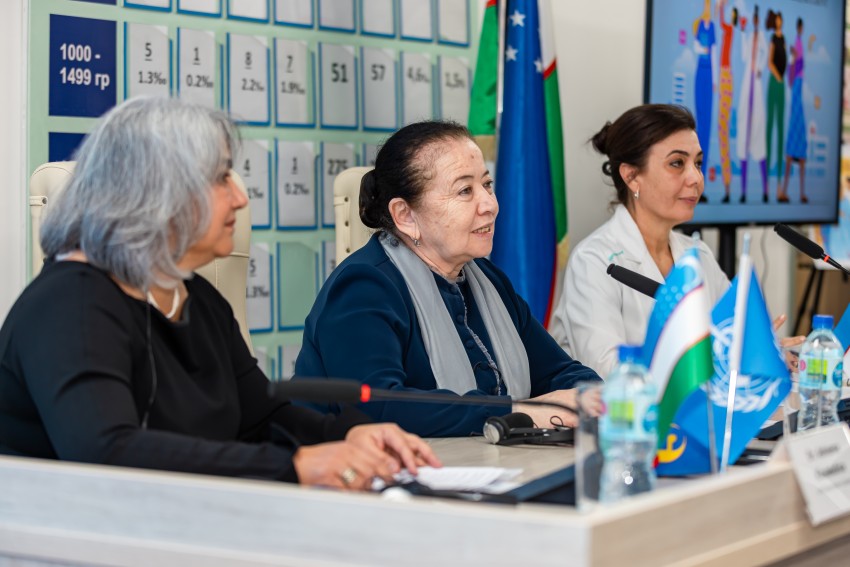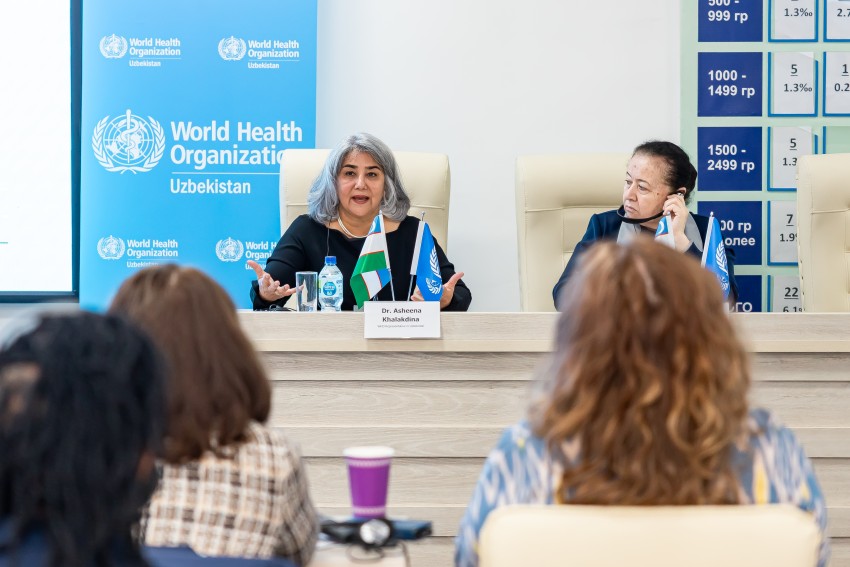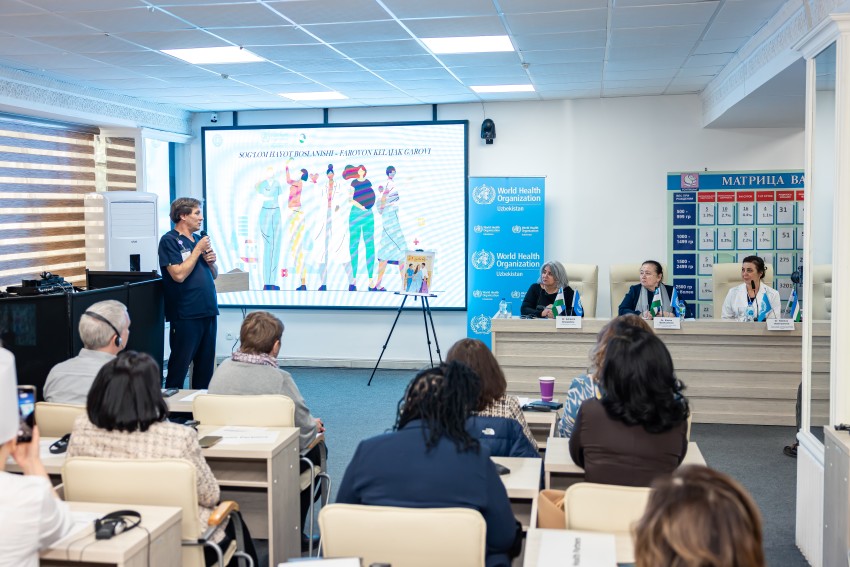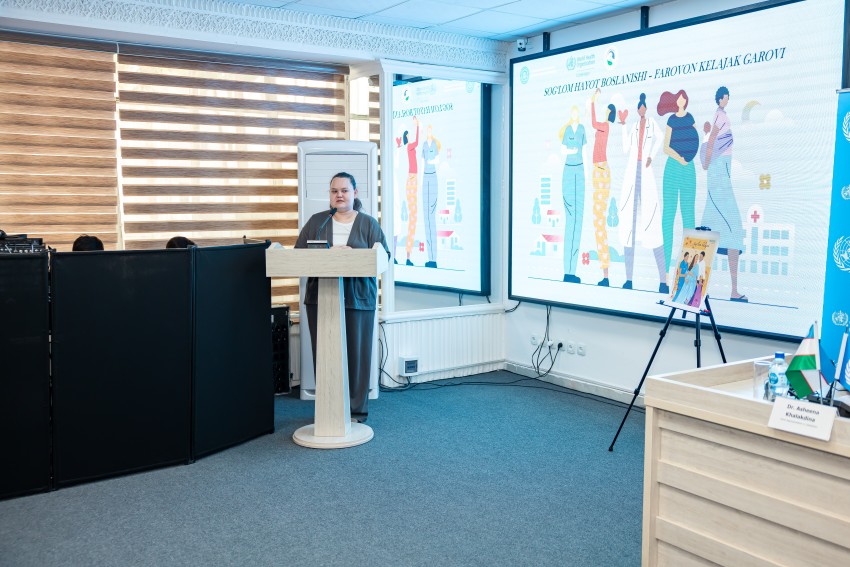The World Health Organization (WHO) in Uzbekistan and the Ministry of Health of Uzbekistan unveiled a public mural titled “Sog‘lom kelajak” (Healthy Future) to mark the culmination of the World Health Day 2025 campaign “Healthy Beginnings, Hopeful Futures”, dedicated to improving maternal and newborn health globally.
The campaign calls on governments, health systems, and communities to work together to ensure that every woman and newborn receives respectful, high-quality care–before, during and after birth. In Uzbekistan this message comes to life through the mural painted on the wall of the Republican Specialized Scientific and Practical Medical Center of Maternal and Child Health.
A story told through art
The mural is a symbol of shared responsibility for maternal and newborn well-being. Each figure in the artwork forms part of a symbolic puzzle: a pregnant woman supported by her partner, a father taking an active role, a healthcare provider listening with empathy, and a young daughter representing the importance of birth spacing. The composition reflects an importance of family support and trustful relationships with healthcare providers during pregnancy, childbirth and postpartum period, along with the WHO’s recommendation to wait at least 24 months between pregnancies (approximately 33 months between births) to help improve health outcomes both for mothers and babies–an approach recognized by the Ministry of Health of Uzbekistan as an important step in improving family health.
Shared vision for healthy futures “The health of mothers and children is one of the country’s key priorities,” said Dr Elmira Basitkhanova, Deputy Minister of Health of Uzbekistan. “Each family plays a significant role in recognizing the importance of comprehensive care for women during pregnancy, childbirth, and the postpartum period, as well as in providing active support from partners and relatives and maintaining optimal intervals between pregnancies.”

The mural was inaugurated alongside a series of short awareness videos developed by WHO in collaboration with the Ministry of Health and national partners. The videos highlight key messages on Partner-Assisted Birth, Breastfeeding and Nutrition, and recognition of danger signs during pregnancy, featuring healthcare workers from the Republican Center for Mother and Child Health and Polyclinic No.7, as well as volunteer student actors of VGIK University, activists and influencers.
“Every healthy mother and baby are supported by a network of caring professionals who stand beside them at every stage,” said Dr Natalya Nadirkhanova, Director of the Republican Centre for Maternal and Child Health. “Doctors, nurses, and midwives combine skill, dedication, and compassion to ensure that women feel safe, heard, and supported–not only medically, but emotionally as well. We are proud to contribute to this campaign.”
“Maternal and child health is at the very heart of WHO’s global mission,” said Dr Asheena Khalakdina, WHO Representative and Head of the WHO Country Office in Uzbekistan. “The Healthy Beginnings, Hopeful Futures campaign in Uzbekistan shows how collaboration between the health sector, creative professionals, and young artists can turn important public health messages into visual stories that resonate with people. These efforts aim to inspire communities to support every woman through a pregnancy and give every child a healthy and hopeful start in life.”

Building a stronger foundation for maternal and newborn health
The mural also reflects WHO’s long-standing partnership with the Ministry of Health as part of WHOs broader global work and under Presidential Decree No. PP–296 (September 2023), which sets out a national vision for maternal and child health. Together with UNICEF and UNFPA with support from the Ishonch Fund, WHO is helping to implement a comprehensive maternal and perinatal care programme across the country.

Over the past two years, WHO has supported Ministry of Health in updating 31 national clinical protocols (25 in obstetrics/gynaecology and 6 in neonatal care) in line with WHO recommendations and integrating them into medical curricula. They are currently being applied through ongoing capacity-building efforts to enhance service delivery and improve clinical practice. Over 200 specialists have been prepared to provide evidence based, high-quality, person-centred perinatal care. Laboratory systems are being strengthened nationwide, with reinforced biosecurity, biosafety, and quality management capacities. WHO facilitated specialized training for over 70 laboratory specialists on ISO 15189:2022, external quality assessment, and internal audits, complemented by mentoring visits and the establishment of a national technical working group to develop a unified laboratory quality management manual.
These joint efforts move Uzbekistan closer to a future where no mother or child is left behind—no matter where they live.
About the artists
The mural was painted by Masterskaya Art Team led by artists Zulfiya Spowart and Delya Khaydarova. The videos feature:
- Specialists from the Republican Institute of Obstetrics, Gynecology and Neonatology: Gulchehra Usmanova, Gulrukh Pulatova;
- Specialists from Polyclinic No. 7: Izatbi Mukhidinova, Feruza Kholniyozova;
- Actors: Nodir Ukliyev, Samira Tukhtieva, Anna Muravyeva;
- Influencers: Madina Muminova (mother and grandmother), Asal Saparbaeva, Madina Muminova, Shahzoda Pirova, Rushana Mamadalieva;
- and emergency medical specialists.
WHO Fact sheet
Maternal and Newborn Health in the WHO Central Asian and European Region
The World Health Day 2025 campaign also spotlights urgent regional priorities for the WHO European and Central Asian Region:
1. Tackling stagnation in progress:
Maternal mortality reductions in the WHO European and Central Asian Region have plateaued since 2013. The COVID-19 pandemic further disrupted progress, exposing vulnerabilities even in countries with strong health systems. It was a first splash of maternal mortality since 1985. Fortunately, the increase observed during the COVID-19 period appear to be temporary and limited in nature. While we have begun to see a return to pre-pandemic trends, the broader stagnation is deeply concerning and necessitates renewed urgency and coordinated action.
2. Ensuring financial protection:
Access to maternal health must not depend on income, legal status, or ethnicity. No woman should face financial hardship when accessing care.
3. Supporting midwives and obstetricians:
These essential health workers need better support, fair pay, and safe working environments to sustain quality services.
4. Prioritizing maternal mental health:
Mental health remains one of the most neglected complications of pregnancy. Routine care must integrate proactive psychological support.
5. Eliminating violence against mothers:
Violence during pregnancy threatens maternal and newborn health. Stronger policies and accountability are needed to ensure safety and dignity in all care settings.
A call to action from WHO
Most maternal deaths are preventable. Globally, the leading causes of maternal mortality—including hemorrhage, hypertensive disorders and pre-existing conditions such as anemia or diabetes—can be addressed through timely access to quality care.
High-quality antenatal care, skilled birth attendance and emergency services are not optional or a privilege. They are essential—and they are a human right. Every woman has the right to bring life into the world without putting her own life at risk. WHO is calling for renewed investment and action— not only to help women and babies survive, but to ensure they thrive.














